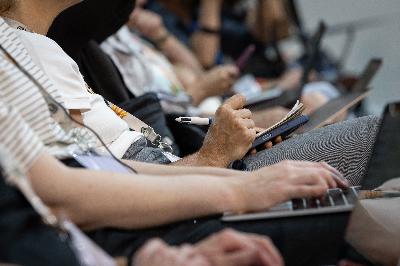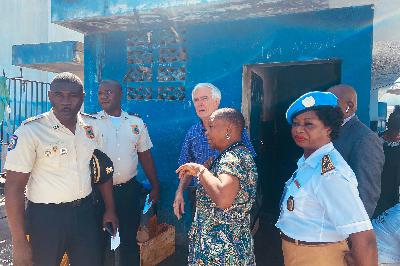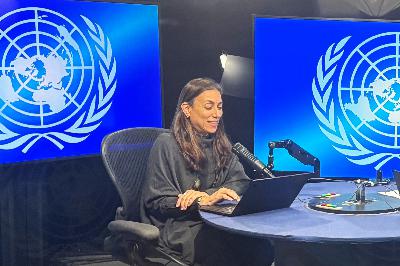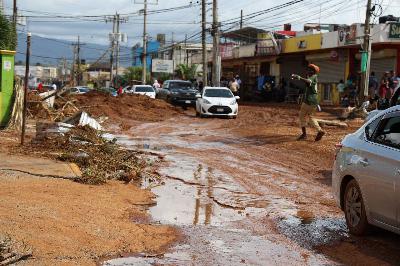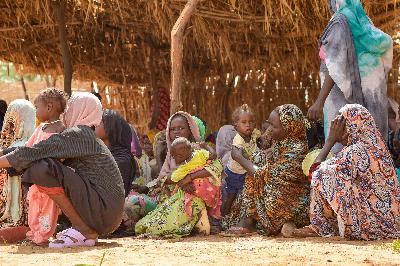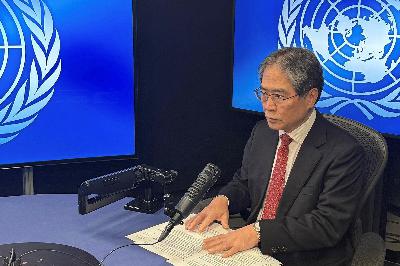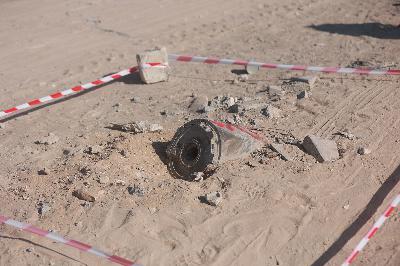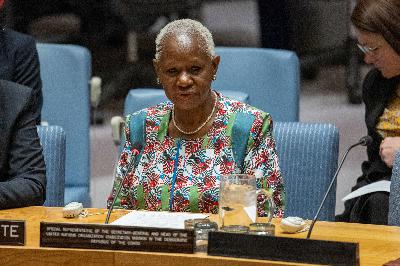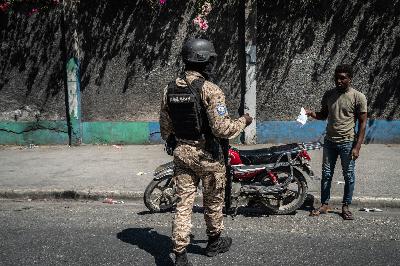Discover UN Interviews
UN Interviews

UN Interviews
Author: United Nations
Subscribed: 60Played: 1,449Subscribe
Share
Description
UN News interviews a wide range of people from senior news-making officials at Headquarters in New York, to advocates and beneficiaries from across the world who have a stake in helping the UN go about its often life-saving work in the field.
328 Episodes
Reverse
Climate change is no longer a distant threat; it is already reshaping lives and communities around the world.Extreme weather – from unprecedented tornadoes to rising seas and creeping desertification – is forcing millions on the run, often within their own countries.At COP30 in Belém this week, Ugochi Daniels, Deputy Director General of the International Organization for Migration (IOM), stressed the importance of local, people-centred solutions.“Early warning systems, predictable funding, and locally led adaptation are critical,” she told UN News’s Felipe de Carvalho.
At a time when false narratives about climate change are spreading faster than ever online, the UN education and culture agency, UNESCO, is calling for stronger global cooperation to safeguard information integrity.Speaking to UN News’s Felipe de Carvalho in Brazil’s coastal city of Belém which is hosting COP30, Guilherme Canela, UNESCO’s Head of Digital Policies who takes a lead on promoting accurate information regarding climate change, says misinformation has become one of the most significant global risks – alongside climate change itself.He stressed that protecting reliable, science-based information is essential for effective climate action.
Filipinos are picking up the pieces after super typhoon Fung-Wong ripped through the country.Eight people including three children are reported to have died because of the typhoon, but it could have been much worse: over a million people were evacuated from homes in 13 of the country’s 18 regions, in one of the Philippines’ largest ever pre-emptive operations.Arnaud Peral, the UN Resident Coordinator in The Philippines, told UN News’s Conor Lennon the way authorities prepared for the impact is testament to the coordination between the government, the United Nations and the international NGOs on the ground.
People being held in prisons in Haiti are dying of starvation in subhuman conditions according to the UN’s Designated Expert on the human rights situation in the Caribbean island nation, William O'Neill.Haiti is facing an increasingly perilous security crisis as gangs compete to control the capital, Port-au-Prince, and surrounding areas, impacting an already dysfunctional justice system.Prisons are severely overcrowded, and some detainees can wait for years to be tried for minor offences, including the theft of chickens or shoes.Daniel Dickinson began by asking Mr. O’Neill to describe the conditions he has witnessed in Haitian prisons.
With half the world’s population under 30, sidelining young people is no longer an option. That’s according to UN Assistant Secretary-General for Youth Affairs, Felipe Paullier, who champions the determination and creativity of the world’s youth.He’s been at the World Summit for Social Development in Doha this week, issuing a strong call to action and urging world leaders to put young people at the heart of decision-making.In an interview with UN News’s Abdelmonem Makki, he said that real progress means making space, so young people have a main seat at the table: “They’re not waiting for us,” he adds, “they’re finding solutions.”
For millions of people with disabilities around the globe, the World Social Summit happening in Doha this week, represents something more powerful than promises – it represents hope.That’s according to Fatma Al Jassim, who is in Doha representing the Global Disability Innovation Hub, a pioneering research centre in the UK, dedicated to driving disability innovation for a fairer world.Speaking to UN News’s Abdelmonem Makki, Ms. Al Jassim explained why true inclusion is key to real change.
Nearly 30 years after the landmark Copenhagen Declaration – when governments pledged to make societies fairer and more inclusive – conversations about putting social development back at the centre of the global agenda have taken on renewed importance.To understand why it’s so critical, and how social protection connects to the broader pursuit of social justice, UN News’s Vibhu Mishra has been speaking to Srinivas Tata, of the UN Economic and Social Commission for Asia and the Pacific (ESCAP).They’re both in Doha where the Second World Summit for Social Development is in full swing, and Mr. Tata began by explain why social justice is not just a vague concept – but an achievable goal.
Thirty years after the first World Social Summit in Copenhagen, global leaders have reconvened in Doha to assess progress and chart a path forward on poverty eradication and social development.Over the past three decades, 1.5 billion people have been lifted out of poverty, and global life expectancy has increased by nearly seven years.However, significant challenges remain, with an estimated 800 million people still living in extreme poverty, according to the United Nations Development Programme (UNDP).Speaking on the role of the UN and on the actions that governments must take to make social development more resilient and sustainable, UNDP’s acting administrator Haoling Xu underscored the importance of rebuilding global trust and solidarity.He spoke to UN News’ Abdelmonem Makki following the political declaration adoption at the World Summit for Social Development on Tuesday.UN News continues to provide on-the-ground coverage from Doha.
The Women, Peace and Security (WPS) Agenda – launched 25 years ago through Security Council resolution 1325 – recognized women are affected by wars in specific ways and must also play a distinct role in resolving them.Mexico, Chile and Colombia have all adopted foreign policies which emphasise gender equality in diplomacy, peacebuilding and development – but more needs to be done for women to be meaningfully included in peace processes and conflict resolution. UN News’s Ileana Exaras spoke to Laura Flores, Director of the Americas Division in the UN’s political affairs and peacebuilding department, about the progress and challenges that continue to affect women in politics across Latin America.
Getting relief to communities in Jamaica cut off by the devastation caused by Hurricane Melissa remains the “main challenge” for UN aid agencies in the Caribbean country.The hurricane tore through the western part of the island — damaging homes, roads, and hospitals, cutting off access to some of the hardest-hit communities.The United Nations team in Jamaica, working alongside the government and local partners, is focusing on providing urgent support — from food, water, and shelter to restoring health services and rebuilding critical infrastructure.UN News' Charlotte Frantz asked Dennis Zulu, the UN’s Resident coordinator and most senior official in Jamaica, about the immediate priorities on the ground.
In a world grappling with growing inequalities, demographic shifts, and the fast pace of technological and environmental change, the Second World Summit for Social Development is bringing leaders together in Doha to talk and take action.Thirty years after the landmark Copenhagen Summit, the mission remains the same: to build a world where progress is measured not just in wealth, but in well-being, equality, and human dignity.Throughout the week, UN News will be on the ground in Doha, bringing you live updates, in-depth reporting, and exclusive interviews.Ahead of the Summit, UN News’s Vibhu Mishra sat down with Bjørg Sandkjær, Assistant Secretary-General for Policy Coordination, to discuss the priorities and expectations for global social development.
Horrifying videos and reported atrocities allegedly carried out by RSF militia in and around the Sudanese city of El Fasher demonstrate a “total disregard” for both protection of civilians and the Security Council’s resolution demanding an end to the civil war.That’s according to the UN’s head of humanitarian operations in the country, Denise Brown, who told UN News after recently visiting the Darfur region before the fall of the city this week, that it’s proving hard to verify information from the stricken city due to a communications blackout.She told Ezzat El-Ferri she feels a “huge sense” of tragedy and responsibility to continue providing UN relief services, adding that the atrocities must be documented so that “justice can be served.”
While the International Court of Justice (ICJ) is not “blind” to political context or the human suffering behind many cases, its main job is to be the interpreter of international law in disputes between States, said the newly appointed President of the UN World Court, Yuji Iwasawa.This year, ICJ issued two advisory opinions that made headlines: one that decided Israel must allow aid to flow freely into Palestine and another ruling that countries have a responsibility to protect the environment.Mr. Iwasawa spoke to UN News’s Ileana Exaras about the functions and responsibilities of the court, the significance of advisory opinions and what he’d like to accomplish throughout his tenure.
As airstrikes and conflict continue to devastate communities across Ukraine, the UN Children’s Fund, UNICEF, is raising urgent concerns about the mental health and well-being of the country’s children.Kenan Madi, Chief of Field Operations for UNICEF in Ukraine, warns that the war is leaving thousands of children without homes, heat, power, or access to basic services, making everyday life “extremely difficult.”Education has also been severely disrupted.Despite ongoing efforts, UNICEF’s appeal for Ukraine remains only partially funded, leaving millions of children at risk as another harsh winter looms.UN News’s Nargiz Shekinskaya started by asking Mr. Madi what are the main needs of the children living on the frontlines of the conflict.
The Russian shelling of a UN humanitarian convoy in the Kherson region of Ukraine earlier this month underscores the risks aid workers face every day, as the Russian full-scale invasion of the country enters its fourth winter.Andrea de Domenico is the Ukraine country head of the UN Office for the Coordination of Humanitarian Affairs. He told Nargiz Shekinskaya from UN News that, despite the dangers they face, and limited resources, he and his team remain committed to helping the population.
As access slowly improves under the Gaza ceasefire deal, the UN Mine Action Service (UNMAS) is scaling up operations and mobilising funds to ensure the safe removal of dangerous munitions following two years of devastating bombardment.Priority is being given to main roads, infrastructure, and essential services for civilians in the enclave who face a deadly threat from unexploded hazards.Luke Irving, head of UNMAS’s mission in the Occupied Palestinian Territory, spoke to UN News’s Ezzat El-Ferri, emphasising a message of hope and resilience for civilians through “small steps” each day.
Women are central to achieving food security in Tanzania as they make up 70 per cent of the East African nation’s agricultural workforce; that’s according to the Food and Agriculture Organization (FAO) Representative in the country, Nyabenyi Tipo.FAO is celebrating its 80th anniversary on World Food Day on 16 October, the theme for which is collaborating for a peaceful, sustainable, prosperous, and food-secure future.Sabrina Said asked Ms. Tipo about the significance of this milestone and how FAO Tanzania is celebrating the occasion.
The head of the UN peacekeeping mission in the Democratic Republic of the Congo, MONUSCO, is urging people in the restive eastern part of the country not to lose hope after years of conflict.Binto Keita spoke to UN News’s Jérôme Bernard a few days after she briefed the Security Council in New York on the overall situation in the DRC.She emphasized that the government, the UN and the international community remain engaged in efforts to bring peace to the east, where armed groups continue to terrorise communities.Ms. Keita expressed compassion and empathy for the Congolese people whose “resilience is also very much admirable.”
A larger and more robust force in Haiti could help “turn the tide” against murderous gangs and give Haitians hope for the future, according to the UN’s designated expert on the human rights situation in the Caribbean country, William O’Neill.Up to 90 per cent of the Haitian capital Port-au-Prince is controlled by numerous gangs who murder with impunity and take hostages for ransom.A UN-backed Multinational Security Support Mission (MSS) has been unable to stem the violence, but it is hoped the transition to a new, larger and better equipped Gang Suppression Force could prove decisive.UN News’s Daniel Dickinson asked Mr. O’Neill how important it is to establish the new force.
At just 15 years old, Zunaira Qayyum has already emerged as a climate champion and a UN Children’s Fund (UNICEF) Youth Advocate for Climate Action and Girls’ Empowerment in Pakistan.In 2022, she began researching how floods and heatwaves in her hometown of Hub, Balochistan, were forcing girls out of school. Her work earned her recognition as one of the winners of UNICEF’s Policy Research Challenge the following year.Today, children across Pakistan face mounting threats from floods, heatwaves, and other extreme weather events, which are making access to education increasingly difficult.UN News’s Hareem Ahmed spoke with Zunaira about her advocacy for gender and climate justice, as well as her views on the importance of youth inclusion in climate action.



